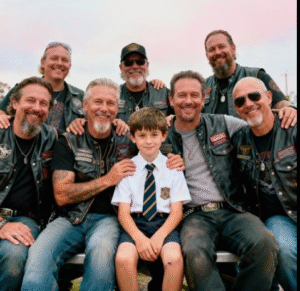No Child Stands Alone: How a Gold Star Boy Found Sixty-Seven Fathers on Career Day
Career Day at elementary schools is usually a lighthearted affair. Parents and relatives visit classrooms to share their professions—firefighters bring helmets, doctors bring stethoscopes, engineers roll in blueprints, and chefs might pass out cookies. For the children, it’s a chance to peek into the adult world and imagine what they might become. But for one boy, Career Day was a looming reminder of what he had lost: his father, a soldier who never came home.
That boy’s story, however, did not end in sorrow. Instead, it became a powerful example of how love, honor, and community can lift up a child who refuses to be left standing alone. What unfolded that day when sixty-seven men stepped into his classroom to fill the role of “Dad” still resonates as one of the most moving accounts of compassion and solidarity in recent memory.
A Gold Star Family’s Silent Struggle
In military families, the term “Gold Star” carries weight. It signifies that a service member has been killed in action, leaving behind loved ones who must carry the burden of grief while society moves on. For the boy at the heart of this story—let’s call him Ethan—life had been divided into “before” and “after.” Before his father deployed, he had memories of backyard football, bedtime stories, and promises of adventures when Daddy came home. After the deployment, there were folded flags, ceremonial rifles, and a hollow silence that no child should have to endure.
Ethan’s mother worked tirelessly to give him as normal a childhood as possible. But when the school announced Career Day, Ethan’s heart sank. While his classmates looked forward to seeing their parents describe jobs in construction, medicine, or law enforcement, Ethan knew his father could not attend. He told his mother quietly, “I don’t think anyone will come for me.”
A Mother’s Quiet Call
Ethan’s mom understood the weight of his words. She reached out privately to the school’s principal and explained her son’s situation. She didn’t ask for much—just that someone in the community might step in to make sure Ethan didn’t feel left out. The principal, moved by her courage, reached out to the local veterans’ network, firefighters, and police officers. What began as a small request spread quickly, fueled by a shared belief: no Gold Star child should feel alone.
The Day the Fathers Came
When Career Day finally arrived, Ethan walked into school wearing a pressed shirt and the nervous smile of a boy trying to be brave. He expected maybe one or two volunteers would show up. But when the classroom door opened, his eyes widened. Not one, not two—but sixty-seven men filed into the room.
They came in uniforms and suits, work boots and ties. Some were firefighters, some were soldiers in dress blues, others were local tradesmen, police officers, or community leaders. Each man had raised his hand and said, “If this boy needs a father today, I will be that father.”
Ethan’s teacher later recalled that the room fell into stunned silence as the men introduced themselves one by one. Each declared not only their profession but their promise to stand with Ethan—not just for a day, but whenever he needed support.
Learning From Sixty-Seven Fathers
That day turned into something far more profound than a typical Career Day presentation. Ethan rotated between groups of men who showed him the tools of their trades, the badges of their service, and the pride of their work. But beyond the demonstrations, there were words of encouragement.
One firefighter knelt down and told him, “Your dad was a hero. That makes you part of a family bigger than you can imagine.” A police officer added, “We’ve got your back. Always.” A construction worker handed him a hard hat and said, “Someday you’ll build something that lasts—just like your dad built a legacy.”
Every man there spoke to him not as a stranger, but as a father figure, affirming his worth and reminding him that grief could never erase the love his father left behind.
The Ripple Effect
Word of what happened in that classroom spread quickly beyond the school walls. Parents, teachers, and neighbors shared the story, and soon it became a symbol of what community can accomplish when people come together. For Ethan’s mother, the sight of her son laughing, smiling, and asking questions with confidence again was more powerful than words could capture.
“I saw a weight lift off his shoulders,” she later said. “For the first time in a long time, he didn’t feel different. He didn’t feel like the boy without a dad. He felt surrounded—loved—not just by me, but by dozens of men who cared enough to show up.”
The sixty-seven volunteers, too, were changed. Many described the experience as one of the most meaningful acts of service they had ever performed. Some stayed in touch with Ethan, sending birthday cards or inviting him to community events. Others found themselves inspired to volunteer more regularly with Gold Star families, recognizing how deeply children needed ongoing support.
More Than a Gesture
It would be easy to dismiss the story as a heartwarming one-time gesture. But to Ethan, it was much more. That day gave him a sense of belonging that endured. Every time he faced a new challenge, he could remember the moment sixty-seven men walked through a classroom door to remind him he was not alone.
Psychologists often stress that resilience in children comes not from the absence of hardship, but from the presence of supportive relationships. For Ethan, those relationships were multiplied sixty-seven times over in one unforgettable moment.
A Lesson for Us All
The story of Ethan and his sixty-seven “fathers” carries lessons far beyond a single school. It reminds us that communities hold the power to heal wounds that institutions alone cannot. It challenges us to notice the children sitting quietly at the edges of classrooms, playgrounds, or neighborhood gatherings—the ones who fear they’ve been left behind.
In a society where headlines often highlight division and conflict, this story offers a counterpoint: a reminder that empathy and unity still exist. It shows that fatherhood, in its deepest sense, is not just about biology but about presence, guidance, and love.
The Continuing Legacy
Today, Ethan is older, and while the pain of losing his father has never fully faded, his path has been shaped by the compassion shown to him that day. He has spoken at community events about the importance of honoring service members’ families and has even expressed interest in joining the military himself one day. Whether or not he does, he carries within him the strength of knowing that he was never truly fatherless—that sixty-seven men stood in the gap when he needed them most.
Conclusion
“No Child Stands Alone” is not just the title of Ethan’s story—it is a call to action. His experience reminds us that in every community, there are children facing losses and challenges that feel too heavy for small shoulders to bear. When we choose to step in, to show up, and to stand with them, we create ripples of hope that last far beyond a single day.
For Ethan, Career Day was supposed to be a painful reminder of what he had lost. Instead, it became a powerful testimony to what he had gained: sixty-seven fathers who carried his father’s legacy forward in love, pride, and solidarity. In their presence, Ethan discovered that while he may have lost one hero, he had gained an army of them—and no child, least of all him, would ever stand alone again.


